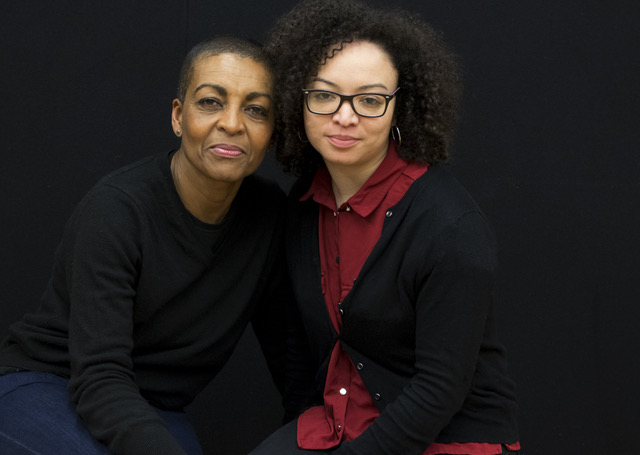Richard II co-directors Adjoa Andoh and Lynette Linton are work colleague goals – vibing off each other as if they were childhood buddies – you can see they are genuine friends with mutual respect for each other’s craft and the skills, talent and expertise they collectively and individually bring to the table.
They are incredibly busy too – so I’m grateful for my 30 minutes with these theatre queens as we caught up before this ground-breaking, first ever company of women of colour production opened at Shakespeare’s Globe. I also salute them for our frank and honest discussion on diversity, inclusion and why it’s time for black people to take up space in theatre.
It’s important that we get this show right so it’s a great encouragement for people – so that women of colour can come along and go ‘that’s us’ – Adjoa Andoh
Sophia A Jackson (SAJ): How are you both?
*raucous laughter from both*
Adjoa Andoh (AA): There’s a lot to do. There’s always a lot to do in our business.
SAJ: How has the rehearsal process been?
AA: You’re always reworking things when you get into previews and put that vibration in front of an audience.
Lynette Linton (LL): You never know what a show is going to be like until you put it in front of an audience. Previews are so important for that time for you to make those changes. I think it’s exciting seeing a play in previews and see what it is half way through the run.
SAJ: Which leads me on to press / opening night. Is there an added pressure because of the nature of this production being the first company of women of colour?
AA: The added pressure is that this is something that’s been our choice to create. Nobody said, ‘please come and do an all women colour production of Richard II’, so that’s a personal choice, so it’s really joyful. It’s like having a baby, you know it’s going to be painful and you’ll appreciate it but then you’ll have a baby. There’s that added pressure but that’s a beautiful pressure. I just want everyone to enjoy it and feel welcomed. It’s important that we get this show right so it’s a great encouragement for people – so that women of colour can come along and go ‘that’s us’.
LL: On press night, in terms of pressure and critics, all of that sometimes makes you forget about why you’re doing the art. If you only care about five-star reviews, then personally, I think you’re doing this for the wrong reasons. I’m much more excited about the young person that’s never been to the theatre before and seen a black woman playing Richard II. That’s much more exciting and the reason why we’re doing this show. This industry gets so caught up in reviews and so caught up with critics and what success is. The pressure is because we want to get this show right not because we’re worried about what the critics are going to say.
SAJ: If the success doesn’t come from the five-star reviews, personally, how will you know that the production has been a success?
LL: It’s already a success because of what we’ve felt in the room. It’s already a success because we’ve walked in and been in this space together and we’ve learnt together and built something that we will be proud of. That’s how I think we both measure a successful production.
AA: It’s already a success because people are excited about it – you don’t want to let them down. The other thing to always remember with all of this; is that people bring their own baggage to the table and we’re not in control of your baggage. All we can do is do the best that we can do and produce a piece of work that we’re proud of that we can say ‘people, come, you’re welcome’. That’s what we’re aiming for. Also, you’re not the only one in the room. Everyone is the only one in the room so we’re altogether. You don’t have to worry about ‘oh I’m representing any and all women of colour or representing all women’.
This is why this show is so important because we want everybody to come. People who might not have come to the Globe before, people who haven’t come to the Sam Wanamaker before and see that this is a story for everyone – Lynette Linton
We’re all the same so come in the room and just be YOU! Be an artist. Be the individual person with nothing to represent apart from the gifts that God blessed you with and just do your work and feel the freedom of that. You, me, Lynette and JuJu are all here because somebody went to the country of our ancestors, and we’ve ended up here. Everybody in the room when we’re rehearsing has that vibration in them and in their DNA. There’s something about the richness of that, the trauma of that and the challenge of that, we all understand without having to explain it. It might be that this is the first time in your artistic career that you are in a room where we can share that… where we can cry together. Where we can talk about tampons, and babies, and parents with dementia and the menopause. Talk about our ancestors and talk about someone back home who needs you to send something and we can do all of that and you just breathe out. It’s not a common experience in this country to feel that we are the majority in this space.
SAJ: So, because it’s not a common experience is the hope that this will not take 60 years for this to happen again?
AA: Absolutely! That’s the hope. We all understand that because they did, we can. And, because we do, another generation hopefully will be able to. The really important bit is because social media exists, there will be a record of our work. For example, Theatre of Black Women, we have an article about them in our programme, I saw them in 1982 but, it’s like they fell off a shelf and nobody as even heard of them. There will be young practitioners in the theatre world of colour who have never heard of Theatre of Black Women. We have to stop reinventing the wheel. We have to make our history documented so that we can keep going, ‘ok, they did that and I’ll do this’, so that we just get on the ladder and walk on the shoulders, rather than thinking we have to start building the ladder again.
SAJ: Going back to opening night… One of my bug bears is that sometimes when I go to see a black production and it’s press/opening night, there aren’t that many journalists of colour. I wondered if you have any input in that for Richard II?
AA/LL: YES!!
LL: We have a lot of input. Adjoa’s been in the industry since 1984 – 35 years. I’ve not been in the industry that long because I’m younger but there’s been too many instances when we’ve seen that and gone ‘why are we the only people here?’ and it’s about taking ownership of that so we’re not going to be in that position because it’s not fair.
AA: Well as much as we can because it’ s not our building but Lynette runs the Bush Theatre now so in her building you wanna check out her press night.
LL: Also you find that they try hard to make press night diverse when it’s a black show but when it’s not a black show, then press night isn’t diverse again. That’s also an issue. It shouldn’t just be ‘the black shows’ that are diverse, it should be every show. They need to get the critics that we get in and keep them coming. It’s a big industry-wide conversation.
AA: It’s a conversation that we want to have.
LL: All theatre venues should be doing that. They should care.
AA: You find that you are doing treble and quadruple the work all the time to produce the same end product. You’re having to push about press, who makes costumes and what for what shape of body, what’s in stock, who you turn to, to make stuff, where you get your instruments from, how you light your shows… Everything is with the same rehearsal period but you are having to do all of this extra work because buildings are not fit for purpose. Yet. Not for purpose that says this is a building where we employ everybody and wants to invite everybody and to be genuinely thinking across the board about everybody and I include in that, access… My father is on two sticks… If you are in a wheelchair… All those sorts of things. There’s a whole way where we do not include ourselves in everything.
Shakespeare has a reputation that is incredible but also scary and some people feel it’s not for them. This is why this show is so important because we want everybody to come. People who might not have come to the Globe before, people who haven’t come to the Sam Wanamaker before and see that this is a story for everyone.
I think there is a blessing in being us so we take consideration of all those things and it’s incremental and it’s slow and it’s exhausting. We are women. We are artists of colour in the 21st century. We are hungry to experience and to share and to pass on knowledge and exchange ideas. We don’t have any choice. If it isn’t there then we have to make it. If there hasn’t been a production by a woman of colour of a Shakespeare ever before in this country, let us do it. If we do it once then someone else will do it. It’s the hope. They will stop thinking of Shakespeare in a particular way. I’m saying that for ALL the people, not just people who are already interested in it but people who are not interested may become interested in it. It’s not just for people who have been to Eton and done a degree in classics.
LL: That’s the big thing that I want to say. That’s why I said ‘yes’ to doing this project. Shakespeare has a reputation that is incredible but also scary and some people feel it’s not for them. If you don’t connect with people when they’re in school because sometimes you’re not taught it properly in school, you go ‘Shakespeare’s not for me’, and check out at 10 -years-old and you don’t check back in. This is why this show is so important because we want everybody to come. People who might not have come to the Globe before, people who haven’t come to the Sam Wanamaker before and see that this is a story for everyone.
SAJ: The word on the street from my peers is that people are genuinely excited about Richard II for all of those reasons. Have you had any negative feedback though?
AA: If you decide to have a flag of St George with a big old brown face on the front, it’s a provocation, is it not? But that’s my point. It’s 400 years since the first slaves were taken by the British from Jamestown in Virginia. That place is still festering with racism and brutality and from that racism and brutality, this country has flourished. That’s just one instance. We have been contributing to the wealth and prosperity of the flag of St George for centuries and centuries so if somebody gets upset because my big old brown face is in front of a flag of St George, bring it on. We are huge contributors to this nation and we always have been. Take up space, people!
SAJ: How has this experience been different to your other theatre experiences?
AA: The first job I ever acted professionally, was an all-black woman show called ‘Where do I go from here’ by Deborah John-Williams and it was at the Drill Hall, Ovalhouse and Acton Community Centre, where the men were rather pi**ed off as the play was pretty down on fathers. I’m saying that this has happened before but not as Shakespeare and I did an African Shakespeare at the RSC (Julius Caesar) but this is a really particular thing. There is something magical about being women of colour. We wanted it to be people from Empire and women – people usually at the bottom of the heap and we tick the boxes so let the people at the bottom tell the story of power for once and see how that story resonates.
SAJ: How did the co-director decision come about?
LL: We worked on a show together called ‘Assata Taught Me’ at the Gate Theatre and fell in love basically and got on really well and since then we’ve been in contact the whole time and said we wanted to work together again. Then Adj, went to see Michelle Terry about something else who ended up asking her to direct Richard II.
AA: I read it and said ‘I’d love to’. Then she said ‘great, who’s going to be your Richard?’. I said, ‘ME’!!! She asked me if I was sure and I said, I’m going to ask my best buddy. So I said Lynette, read the play because if you hate the play then there’s no point.
SAJ: What kind of creative challenges have you had and who has the overall say?
AA: What happens is, one of us will have an idea, then the other one will say oh no I’ve got a better idea and then we’ll go backwards and forwards. Or one of us will say, I was thinking that as well.
LL: Yes, that happens a lot. It’s not about who has the final say, it’s about what’s built to the idea. Adj is an absolute expert when it comes to the language of Shakespeare in a way that I’m not so I’m learning from her.
AA: She’s good at planning, structure and things in space and shapes and objects and clarity of storytelling.
LL: So we sort of merged that together and it’s a good balance.
AA: We are both interested in doing the thing that’s best for the show. It’s not about brownie points or any of that sh*t. We are so beyond all of that.
LL: We look each other so straight in the face and say if we don’t think something is going to work.
SAJ: For Lynette – how are you balancing being artistic director of Bush Theatre with co-directing Richard II at the Globe?
LL: I haven’t officially started working at Bush Theatre. The Globe does shorter days and Adj has been so supportive. It is a lot and also Sweat was happening at the same time but it’s been great because when you walk into that space Adj is holding it or it’s the other way around as there’s things going on in Adj’s life, as well.
SAJ: How do you think audiences will react to the gender swap?
LL: I don’t think it’s a gender swap. I think we are playing the characters. Adj says this lovely thing about it being about the bodies in the space and it’s about the characters and you’re playing the characters. There’s no ‘I’m playing a man’ or ‘I’m playing a woman’. ‘I’m playing Richard II. I’m playing the queen. It’s a really refreshing way of looking at it.
AA: This will be the third Shakespearian man I’ve played in a year – I was in Nick Hytner Julius Caesar at the Bridge Theatre by Nick Hytner, Ulysses in the RSC’s Troilus and Cressida, and now this one. With none of them did I say I’m playing a man. That’s how we live. We are four women in this room, we are all women of colour and we’re all different. We are just a person in the end.




























